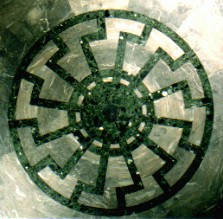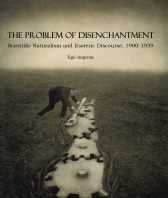For some time now, a debate has been rolling about the status of “pagan studies” as a field of academic research. It’s not that there’s been any doubt about the importance of studying contemporary paganisms; on the contrary, academic as well as mainstream interest in reconstructionist pagan groups as well as magical groups along the lines of Wicca and Thelema, still appears (anecdotally) on the increase. The problem has rather been with the aims and goals of pagan studies as a prospective discipline, as well as the approaches advocated for studying it. In an article just published in The Pomegranate – the foremost (or, rather, the only) peer-reviewed academic journal dedicated to this field – the up-and-coming (and highly productive) scholar, Ethan Doyle White (known from the Albion Calling blog), argues that the time has come for reform.
The scholastic imagination

The human sensory and cognitive system, according to the German scholar Johan Lindner of Mönchenburg. Illustration to a manuscript copy of Aristotle’s De Anima (1472-1474), courtesy of the Wellcome Collection (MS 55).
I’ve recently been reading up on medieval theories of cognition. The background is a paper I’m writing on esotericism and “kataphatic practices” – contemplative techniques where the practitioner uses mental imagery, sensory stimuli, and emotions to try and achieve some religious goal: Prayer, piety, divine knowledge, salvation, etc. Kataphatic practices may be distinguished from “apophatic” ones, which, although they may be pursuing the same goals, use very different techniques to achieve them: withdrawing from sensory input and attempting to empty the mind of any content, whether affective, linguistic, or imagery-related (note that the kataphatic-apophatic distinction is more commonly used as synonymous with positive vs. negative theology – that’s a related but separate issue to the one I talk about here). My argument is that esoteric practices are typically oriented toward kataphatic rather than apophatic techniques. The cultivation of mental imagery is usually key – which means that the notion of “imagination” needs to be investigated more thoroughly.
Review symposium on “The Problem of Disenchantment”
The Journal of Religion in Europe has just published a review symposium on my book, The Problem of Disenchantment (2014). I’m excited to say that it contains critical reflections from three world-class scholars of religion, along with my own response. Hans Kippenberg, a well-known expert on Weberian approaches to the history of religion, evaluates some of the book’s claims in light of a broader reading of Weber’s oeuvre. Willem Drees, one of the leading figures in the “religion and science” field, takes a closer look at some of the points I made about the new natural theologies that emerged in the early twentieth century – specifically their relation to esotericism and “heterodoxy”. Finally, Ann Taves, a leading American scholar of religion working with (among other things) the cognitive science of religion and the notion of experience, continues a discussion that she and I have been having over the past few years regarding the perception, explanation and interpretation of “events” (for more on this, check out our forthcomming co-authored target article in Religion, Brain, & Behavior) . If you’ve got access, go ahead and read them!
While you are at it, you may also be interested in checking out my response, which I called “The Disenchantment of Problems: Musings on a Cognitive Turn in Intellectual History” (non-final version uploaded here, and added to my Academia page for easy access).
Religion in the Age of Cyborgs. An essay and a lecture
 What happens to religion if the future belongs to the cyborgs? I’ve just written a weird essay addressing this topic, and am currently finishing up a lecture on the same topic for the Transhuman Visions conference in Piedmont on Saturday. The published piece is a response essay that I was asked to write for The Religious Studies Project, answering to an interview with the influential cognitive neuroscientist / evolutionary psychologist Merlin Donald. It’s a strange concoction of evolutionary theory, cultural history, futurist forecasting, transhumanism, distributed cognition, extended mind hypothesis, and cognitive science of religion. Pretty speculative all over, in fact, but fun to write. Check it out if you’re into that sort of thing. The talk to the transhumanists is going to be even more speculative, so you’re warned!
What happens to religion if the future belongs to the cyborgs? I’ve just written a weird essay addressing this topic, and am currently finishing up a lecture on the same topic for the Transhuman Visions conference in Piedmont on Saturday. The published piece is a response essay that I was asked to write for The Religious Studies Project, answering to an interview with the influential cognitive neuroscientist / evolutionary psychologist Merlin Donald. It’s a strange concoction of evolutionary theory, cultural history, futurist forecasting, transhumanism, distributed cognition, extended mind hypothesis, and cognitive science of religion. Pretty speculative all over, in fact, but fun to write. Check it out if you’re into that sort of thing. The talk to the transhumanists is going to be even more speculative, so you’re warned!
Book review editor of Correspondences
As was just announced at the Correspondences website, the journal has a new book review editor. It’s me. As is well known, I’ve been enthusiastic about this new journal from the start. Taking on a more active role in developing it further is going to be a great pleasure. I hope to build a strong review section that fully exploits the speed in online publication and the open-access format. We can publish reviews of the very latest literature, and we can make this available to a large population that goes beyond those who happen to be employed at privileged institutions with subscriptions to the existing journals. For book reviews, this is a very attractive feature. I think that authors, publishers, students, researchers and independent readers will all appreciate this fact. So keep an eye on this, but give me a few issues to get it going!
Oh, and I should add: if you are an author or a publisher looking to get a book reviewed, you may email me at egil.asprem@correspondencesjournal.com. Review copies can be sent to my office address: Egil Asprem, Department of Religious Studies, Humanities and Social Sciences Building, University of California Santa Barbara, CA 93106-3130, USA.
If you are a student or otherwise have been working on a book review that you would like to see published, I’d love to hear from you as well. We are very interested in considering independent initiatives like that. Just drop me an email.
By the way: I hear issue 2.1 is soon ready. Remember to consider article submissions for 2.2! There will be an official call for submissions later, but here’s an extra early reminder. Have a look at the first issue, 1.1, for an idea.
Religious Studies Project (RSP) launches research article: online self-presentations of the study of religion/s
The Religious Studies Project is closing up on its second birthday. It has been a strong presence for the academic study of religion online since launching in January 2012, having released about 60 podcast interviews, numerous blog-style essays, book reviews, reports from conferences and so forth. Now the gentlemen Cotter and Robertson expand business in the direction of scholarly publishing, with the release of an online open-access research article. Knut Melvær and Michael Stausberg (both University of Bergen) have the honour of pioneering what could become a very exciting new development at RSP, with an article fittingly reporting on research into the online self-presentations of the study of religion/s.
The Magus of Silicon Valley – multiple afterlives of a conference paper
Transhumanism and religion proves a popular topic. I started exploring some aspects of the transhumanist movement from the perspective of a scholar of religion and esotericism earlier this year, in connection with a conference. I have never had more responses from so many different audiences to a conference paper. After uploading my “Magus of Silicon Valley” paper to Academia.edu this summer, I’ve had private messages, emails, reblogs and comments (including a few annoyed transhumanist reactions) – several requests for spinoffs. First of this was a public lecture in the occulturally oriented Forum Nidarosiae in Trondheim. There’s also been interest from more old-fashioned humanists (the type that’s not too impressed by flashy prefixes such as trans-, post-, or neo-). Thus, a spin-off article is underway with the Norwegian secular humanist magazine Humanist, while another has just now been published in the Australian online magazine MercatorNet – describing itself as being of “dignitarian” orientation, which I take to be a non-confessional, non-partisan, cross-worldview form of humanism (the editor in chief, Michael Cook, is open about his Catholic leaning – while justifications appear to be classic European Enlightenment: no revelation, just reason, evidence and critical practice).
So if you haven’t read it yet, “The Magus of Silicon Valley” is now relaunched in a new medium – slightly edited and modified for the occasion (the jargon should be a little less Academese this time around). They also added a link to a very recommendable documentary on Ray Kurzweil: “Transcendent Man”. Watching it a few years back contributed to my interest in doing something on the movement from a religious studies perspective.
It’s time to sit back and await the first accusations of being in league with this or the other vested interest, dissing the transhuman visionary movement – or perhaps even supporting the coming Inquisition against it.
![]()
This blog post by Egil Asprem was first published on Heterodoxology. It is licensed under a Creative Commons Attribution-ShareAlike 3.0 Unported License.
Towards Esotericism 3.0 – W. J. Hanegraaff reviews seven esotericism textbooks
If you’re new to the field of Western esotericism, planning to set up an introductory course somewhere, or wondering what to read as a crash-course to the field, here is something you have to read first. The upcoming issue of the journal Religion (“iFirst” version available online now for subscribers) publishes a lengthy review article by Wouter J. Hanegraaff, a leading expert in the field, going through as many as seven introductory level textbooks that have been published over the last eight years (since 2004). More than just a review of introductions, the article engages critically with the theoretical and methodological challenges of the field, and takes a clear stand on where one should go from here. The result is an article that analyses the present situation of esotericism research, provides an overview of strengths and weaknesses in the basic literature that newcomers are likely to encounter, and offers a pronounced and programmatic statement for future researchers and teachers.
Nazi-occultism on the ContERN website
Next up in the cyberproceedings from the Contemporary Esotericism conference is a paper by Eva Kingsepp on Nazi/SS occultism, the changing perceptions of it in “official memory culture”, and its reception and influence on contemporary occulture. The primary focus is on the heavily mythologized symbol of the “Black Sun”, and the SS’ Wewelsburg castle, alleged to be the magical centre of the Third Reich, where Heinrich Himmler gathered his SS “knights” and performed sinister rituals under the occult sign of the Black Sun.
Or not. As Kingsepp shows, myths of this kind have by now been properly debunked by real historiography. That, however, does not diminish the effect of the Nazi-occult mythology in popular culture and occulture.
From the introduction:
The aim of this paper is twofold, both related to the uses of history. The first concerns the basic assumptions about Nazi occultism as a phenomenon in itself. -What are the discursive relations between official memory culture and popular culture regarding Nazi occultism? The second is to look at the Temple of Set, more specifically its Order of the Trapezoid, as an example of how an esoteric group relates to Nazi occultism and puts this, as it is being conceived by leading members of the Order, into magical use. -From where do practicing occultists working with elements from National Socialism get the theoretical basis for what might be called their magical ideology








